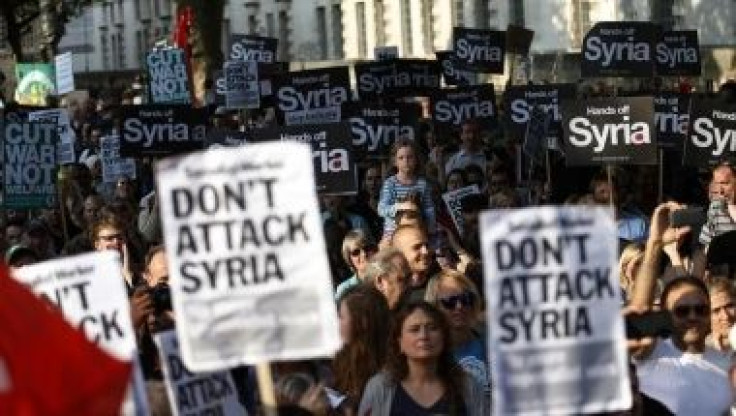US Military Strike On Syria: Nations Play It Safe While US Allies Tone Down Warlike Rhetoric

The U.S. has ramped up its belligerent rhetoric against Syrian President Bashar Assad’s government, but global reaction to a seemingly imminent military intervention led by U.S. forces, has been sharply polarized.
Key U.S. allies in Europe, including the UK and Germany, played down the prospect of a U.S.-led military strike amid domestic opposition from political parties and the public, while the Arab League called for an international response to the Syrian government’s alleged use of chemical weapons.
UK Prime Minister David Cameron has long been vehemently against atrocities committed by Syrian government forces, but UK’s Foreign Secretary William Hague, on Wednesday, said talks about the Syrian crisis would continue at the United Nations, or U.N., “over the coming days,” to authorize a military strike on Syria, although Russia and China, which are staunchly against foreign intervention, are most likely to veto UK’s resolution in the U.N. Security Council.
“We have put forward to them a draft resolution which condemns the use of chemical weapons, which demands that the Assad regime cease to use such weapons and which resolves to do what is necessary to alleviate the suffering of the Syrian people affected by chemical weapons attacks and to try to prevent the further use of the chemical stockpiles of the Assad regime,” Hague was quoted as saying by The Guardian. “We are clear that … if there isn't agreement at the United Nations, then we still have a responsibility; we and other nations still have a responsibility.”
Cameron was unable to ensure the Labour Party’s support in a Commons debate on Thursday regarding military action in Syria, while German Chancellor Angela Merkel is walking a tightrope ahead of federal elections on Sept. 22, as Germans are largely opposed to military action.
“The Syrian regime must not hope to be able to continue this warfare that violates international law ... Therefore an international reaction is inevitable in the view of the chancellor and the prime minister,” the German government said in a statement, on Wednesday, referring to a telephone conversation between Merkel and Cameron, Reuters reported.
French President Francois Hollande remains non-committal to a military strike, although he also has long been firmly against Assad’s government.
Israel, a key U.S.-ally in the Middle East, mobilized its reserve forces and strengthened missile defenses, as part of preparations for a fallout from a U.S.-led strike on Syria, Reuters reported on Wednesday.
Russian President Vladimir Putin and Iranian President Hassan Rouhani said the use of chemical weapons is unacceptable but voiced opposition to foreign intervention on Wednesday, following a telephone discussion between the two leaders, the Globe and Mail reported.
China, yet another key ally of the Syrian government, along with Iran and Russia, said on Thursday that any military intervention would worsen turmoil in the Middle East, adding that a political resolution is “the only way out for the Syrian issue,” Reuters reported, quoting Foreign Minister Wang Yi.
The Arab League is opposed to Assad's regime but major U.S. allies in the Middle East have stopped short of publicly offering support to a U.S. strike. Political parties in Egypt, which is struggling to overcome a political crisis of its own, also have opposed military action.
Among African nations, South Africa, which has been moving closer to China and Russia, has voiced opposition to a military strike.
Left-leaning South American nations such as Bolivia, Cuba, Ecuador and Venezuela have all voiced opposition to a military strike by the U.S., while Brazil, Argentina and Mexico have been cautious, avoiding public calls for action against Syria.
Among Asian nations, India is expected to support a joint action by the U.N. Security Council, rather than a unilateral strike by the U.S. and its allies, as New Delhi remains concerned about further external shocks to its weakened economy, if oil prices surge as a result of turmoil in the Middle East.
Other Asian nations such as Malaysia, Indonesia and Japan have expressed concern over the use of chemical weapons in Syria, but have not called for military intervention, while Australia, a U.S. ally in the Asia-Pacific, has called on the international community to move toward an agreement in responding to the Syrian regime.
However, “no-one is looking to Australia for military assistance,” Defense Minister Stephen Smith said, and “no-one is contemplating troops on the ground” in Syria, ABC News reported.
© Copyright IBTimes 2024. All rights reserved.












